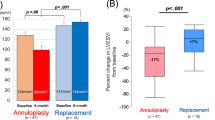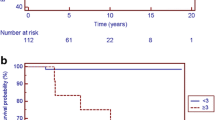Abstract
Clinical outcomes among children with idiopathic dilated cardiomyopathy (IDC) are diverse, which makes the decision as to when a patient should be listed for a cardiac transplantation challenging. This study aimed to determine echocardiographic and clinical variables that can help clinicians identify those at highest risk for death or cardiac transplantation. The study was a single-center, retrospective chart review of children with IDC. Patients younger than 18 years with a diagnosis of IDC, as defined by a left ventricular end-diastolic dimension (LVEDD) z-score higher than 2, and fractional shortening of less than 28 % on the initial echocardiogram, were included in the study. Echocardiographic parameters including mitral regurgitation (MR) grade and certain clinical parameters at the time of presentation were assessed. A follow-up echocardiogram was similarly studied. The study included 49 children with IDC. Those who died or underwent cardiac transplantation were grouped as “nonsurvivors” (n = 26). The remaining children who either completely recovered or experienced chronic dilated cardiomyopathy were grouped as “survivors” (n = 23). The median age overall was 1.25 years (range 0.1–17 years). The follow-up echocardiograms of the survivors showed significant improvement in left ventricle size, systolic function, left atrial volume, and MR grade, whereas these parameters did not change in the nonsurvivor group. The use of inotropic medications at initial presentation was an independent predictor of death or cardiac transplantation (p < 0.05). The presence of moderate to severe MR at diagnosis also was predictive of a worse outcome.


Similar content being viewed by others

References
Alvarez JA, Wilkinson JD, Lipshultz SE (2007) Outcome predictors for pediatric dilated cardiomyopathy: a systemic review. Prog Pediatr Cardiol 23:25–32
Azevedo VMP, Albanesi Filho FMA, Santos MA, Castier MB, Tura BR (2004) How can the echocardiogram be useful for predicting death in children with idiopathic dilated cardiomyopathy? Arq Bras Cardiol 82:505–514
Azevedo VM, Santos MA, Albanesi Filho FM, Castier MB, Tura BR, Amino JG (2007) Outcome factors of idiopathic dilated cardiomyopathy in children: a long-term follow-up review. Cardiol Young 17:175–184
Azevedo VMP, Albanesi Filho FMA, Santos MA, Castier MB, Tura BR, Amino JG, Da Cunha MOM (2008) Is myocardial performance index an independent echocardiographic marker of death in children with idiopathic dilated cardiomyopathy? Clin Cardiol 31:424–430
Carvalho JS, Silva CMC, Shinebourne EA, Redington AN (1996) Prognostic value of posterior wall thickness in childhood dilated cardiomyopathy and myocarditis. Eur Heart J 17:1233–1238
Daubeney PEF, Nugent AW, Chondros P, Carlin JB, Colan SD, Cheung M, Davis AM, Chow CW, Weintraub RG on behalf of the National Australian Childhood Cardiomyopathy Study (2006) Clinical features and outcomes of childhood dilated cardiomyopathy results from a national population-based study. Circulation 114:2671–2678
De Bonis M, Lapenna E, Verzini A, La Canna G, Grimaldi A, Torracca L, Maisano F, Alfieri O (2008) Recurrence of mitral regurgitation parallels the absence of left ventricular reverse remodeling after mitral repair in advanced dilated cardiomyopathy. Ann Thorac Surg 85:932–939
Dillon AR, Dell’Italia LJ, Tillson M, Killingsworth C, Denney T, Hathcock J, Botzman L (2012) Left ventricular remodeling in preclinical experimental mitral regurgitation of dogs. J Vet Cardiol 14:73–92
Fernandes FP, Manlhiot C, McCrindle BW, Mertens L, Kantor PF, Friedberg MK (2011) Usefulness of mitral regurgitation as a marker of increased risk for death or cardiac transplantation in idiopathic dilated cardiomyopathy in children. Am J Cardiol 107:1517–1521
Foerster SR, Canter CE, Cinar A, Sleeper LA, Webber SA, Pahl E, Kantor PF, Alvarez JA, Colan SD, Jefferies JL, Lamour JM, Margossian R, Messere JE, Rusconi PG, Shaddy RE, Towbin JA, Wilkinson JD, Lipshultz SE (2010) Ventricular remodeling and survival are more favorable for myocarditis than for idiopathic dilated cardiomyopathy in childhood: an outcomes study from the Pediatric Cardiomyopathy Registry. Circ Heart Fail 3:689–697
Fujioka S, Kitaura Y, Ukimura A et al (2000) Evaluation of viral infection in the myocardium of patients with idiopathic dilated cardiomyopathy. J Am Coll Cardiol 36:1920–1926
Jiamsripong P, Honda T, Reuss CS et al (2008) Three methods for evaluation of left atrial volume. Eur J Echocardiogr 9:351–355
Pietra BA, Kantor PF, Bartlett HL et al (2012) Early predictors of survival to and after heart transplantation in children with dilated cardiomyopathy. Circulation 126:1079–1086
Quinones MA, Pickering E, Alexander JK (1978) Percentage of shortening of the echocardiographic left ventricular dimension: its use in determining ejection fraction and stroke volume. Chest 74:59–65
Taliercio CP, Seward JB, Driscoll DJ, Fisher LD, Gersh BJ, Tajik AJ (1985) Idiopathic dilated cardiomyopathy in the young: clinical profile and natural history. J Am Coll Cardiol 6:1126–1131
Towbin JA, Lowe AM, Colan SD, Sleeper LA, Orav EJ, Clunie S, Messere J, Cox GF, Lurie PR, Hsu D, Canter C, Wilkinson JD, Lipshultz SE (2006) Incidence, causes, and outcomes of dilated cardiomyopathy in children. JAMA 296:1867–1876
Why HJ, Meany BT, Richardson PJ, Olsen EG, Bowles NE, Cunningham L, Freeke CA, Archard LC (1994) Clinical and prognostic significance of detection of enteroviral RNA in the myocardium of patients with myocarditis or dilated cardiomyopathy. Circulation 89:2582–2589
Zoghbi WA, Enriquez-Sarano M, Foster E et al (2003) Recommendations for evaluation of the severity of native valvular regurgitation with two-dimensional and Doppler echocardiography. J Am Soc Echocardiogr 16:777–802
Author information
Authors and Affiliations
Corresponding author
Rights and permissions
About this article
Cite this article
Patange, A., Thomas, R. & Ross, R.D. Severity of Mitral Regurgitation Predicts Risk of Death or Cardiac Transplantation in Children With Idiopathic Dilated Cardiomyopathy. Pediatr Cardiol 35, 232–238 (2014). https://doi.org/10.1007/s00246-013-0764-7
Received:
Accepted:
Published:
Issue Date:
DOI: https://doi.org/10.1007/s00246-013-0764-7



